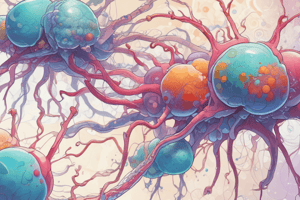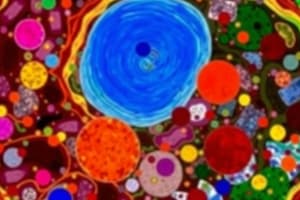Podcast
Questions and Answers
Who is credited with discovering the first living cell?
Who is credited with discovering the first living cell?
- Felix Dujardin
- A.V. Leeuwenhoek (correct)
- Rudolf Virchow
- Robert Hooke
What is the term coined by Purkinje in 1839?
What is the term coined by Purkinje in 1839?
- Cytology
- Cellulae
- Protoplasm (correct)
- Sarcode
What is the Greek word that 'cell' is derived from?
What is the Greek word that 'cell' is derived from?
- Cytoplasm
- Sarcode
- Cellulae (correct)
- Protoplasm
Which of the following organisms is an example of a unicellular organism?
Which of the following organisms is an example of a unicellular organism?
What is the term for the study of the structure and composition of cells?
What is the term for the study of the structure and composition of cells?
Who first observed cells in a dead cork slice?
Who first observed cells in a dead cork slice?
What is the type of cell that has a well-developed nucleus with a nuclear membrane and nucleolus?
What is the type of cell that has a well-developed nucleus with a nuclear membrane and nucleolus?
What is the consistency of protoplasm under different conditions?
What is the consistency of protoplasm under different conditions?
Who expanded the 'Cell Theory'?
Who expanded the 'Cell Theory'?
What is an exception to the Cell Theory?
What is an exception to the Cell Theory?
Study Notes
Cell Structure and Composition
- Cells are the basic structural and functional units of all life forms.
- Study of structure and composition of cells is called Cytology.
Discovery of Cells
- Robert Hooke first observed cells in a dead cork slice in 1665.
- He described his findings in his book "Micrographic".
- The word "cell" was derived from the Greek word "Cellulae", meaning small room.
- The first living cell was discovered by A.V. Leeuwenhoek.
Protoplasm
- Protoplasm was coined by Purkinje in 1839.
- It was discovered by Felix Dujardin and named as sarcode.
- Protoplasm has varying consistency under different conditions and exists in sol-gel states.
- It is an aggregate of various chemicals such as water, ions, salts, and other organic molecules like proteins, carbohydrates, fats, nucleic acids, vitamins, etc.
Cell Theory
- The cell theory was given by Schleiden and Schwann, and later expanded by Rudolf Virchow.
- The cell theory states that:
- All plants and animals are composed of cells.
- Cell is the basic unit of life.
- All cells arise from pre-existing cells.
- Viruses are an exception to the cell theory.
Types of Cells and Organisms
- On the basis of the number of cells, organisms can be categorized as:
- Unicellular organisms (e.g. Amoeba), which are made up of a single cell that performs all vital body functions.
- Multicellular organisms (e.g. plants and animals), which are made up of numerous cells that combine to form organs and organ systems.
- On the basis of the type of organization, cells can be categorized as:
- Prokaryotic cells (e.g. Bacteria), which are primitive and incomplete cells with less developed nuclei without nuclear membrane and nucleolus.
- Eukaryotic cells (e.g. Plants and animals), which are well-developed cells with advanced nuclei with nuclear membrane and nucleolus.
Cell Shape and Size
- Cells have variable shapes and sizes, with shapes dependent on their function.
- Cells can be spherical, elongated (nerve cell), branched (pigmented), discoidal (RBC), spindle-shaped (muscle cell), etc.
- The size of cells varies depending on the type of organism, ranging from 0.2 µm to 18 cm.
- A typical cell in a multicellular organism ranges from 20-30 µm in size.
- The largest cell is the ostrich egg, with a diameter of 15 cm (with shell) and 8 cm (without shell).
Studying That Suits You
Use AI to generate personalized quizzes and flashcards to suit your learning preferences.
Description
Test your knowledge of cells, the basic units of life, including their discovery, structure, and composition.




